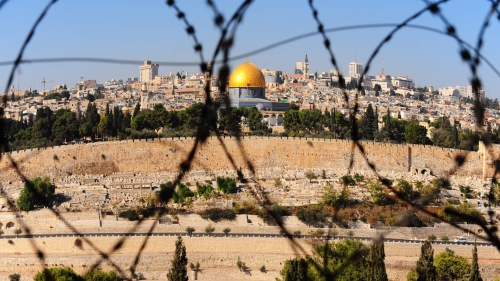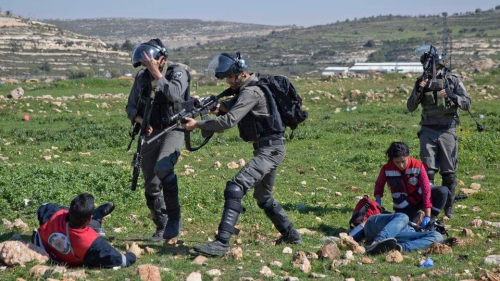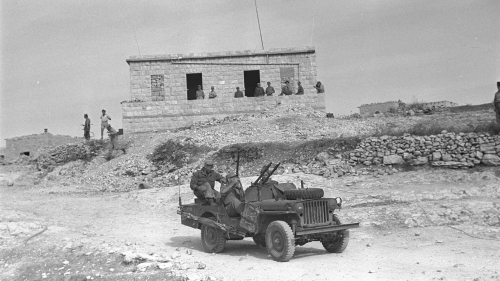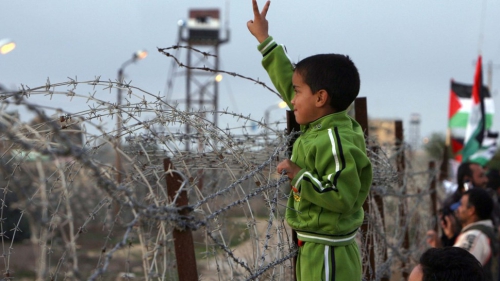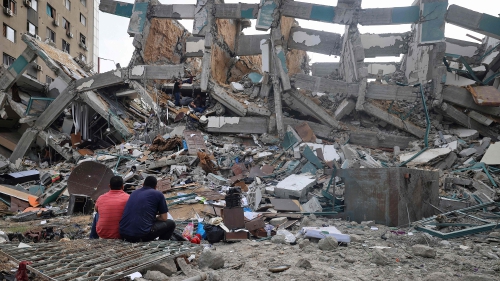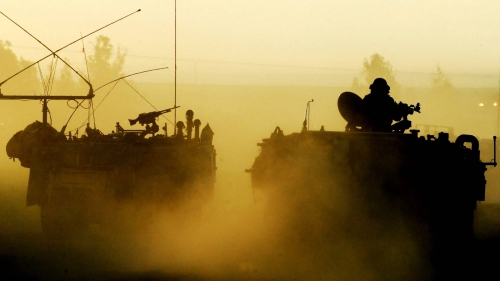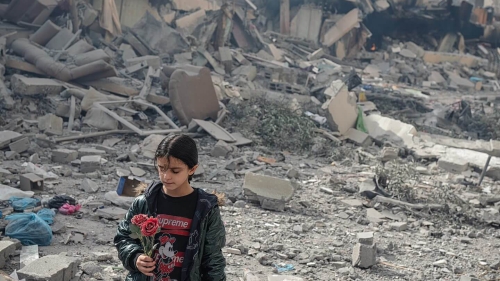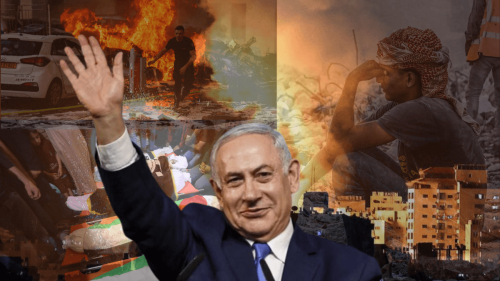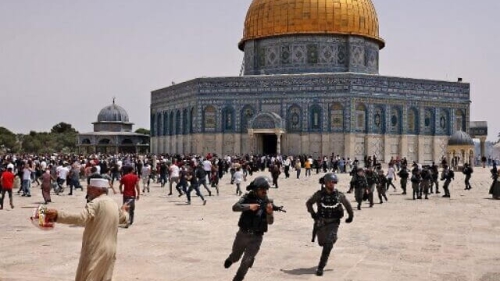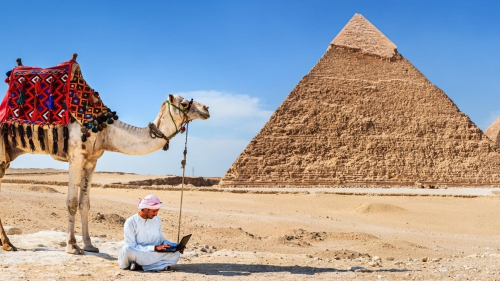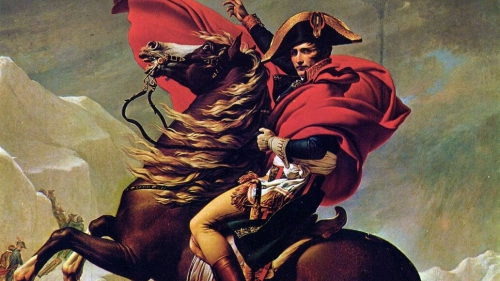Jewish settlers terrorize Palestinian families - A firsthand account
Because of the conflict in Palestine, my family and I, living within the area Israelis deem Jerusalem's environs, are under imposed curfew. We cannot leave the house at night and in some curfews, not in the day either. Even if one of us becomes violently ill, we cannot go out to summon a physician or go to a hospital. If we need milk from the store, we have to wait. Jerusalem is as silent at night as the famous Christmas song, "Silent Night, Holy Night." Only in our case, the holy part is somehow missing.
A few days ago, everyone in my family was immersed in work: Dad and my sister were reading, Mother and my brother in the kitchen and I editing material I wanted to submit for publication. Suddenly, we heard a cry from outside. It was one of our neighbors calling out like a Palestinian Paul Revere, America's famous nightrider warning that the "British are coming." "Settlers in Dahiat Al Bareed. Citizens be careful," our neighbor shouted out in Arabic.
Settlers are as varied as people anywhere, but most believe fully in their right to be in the Holy Land. They have come, some tell us, in order to fulfill God's command that all the righteous, especially, all the righteous Jews, live in the Holy Land to prepare the way for the coming of God or God's acts of salvation. I have heard it said that none of us can find our way to the rapture of God until all the righteous have settled in and around Jerusalem. There are no earthly, secular laws that supercede God's injunctions. The Holy Land, say the Zionists, belongs to God, and they, the Jewish settlers, have come to claim what God has ordained.
Neve Yaqoub, translated in English as Prophet Jacob, is the settlement nearest our home. The night of the attack was dark without shadows, but we peered into the night from our windows trying to see. We could only hear shooting and shouting in Hebrew: "Mavet Learaveem"-Death for Arabs. Mom came from the kitchen and commanded us with a calming voice. "Get away from the windows," she said. We dared not disobey. Instead of watching, we hustled around turning off our lights.
From the nearby mosque, we heard a voice on the loud speaker. It was not the usual call to prayer that we are accustomed to hearing five times a day. This Arabic speaker told us to gather stones and glass for defense and to stay in our homes with the lights out.
Outside our compound, we heard the rustle of kids gathering stones. A positive in this horror is that the kids actually cleaned up the area. Here in Jerusalem, where the Israeli municipality services are limited to Jewish neighborhoods, it is our custom to gather stones that clutter our byways and put them away. Families have been after their boys to do this for months, but asking our kids to clean up the streets is like asking American kids to take out the garbage. Somehow, the chores don't always get done. Now, like teenagers anywhere, they rise to the task. It is exciting; there is danger, but the youths of our village cannot imagine that anything will really happen to them.
Later ignoring our mom's command, we snuck to our windows to see what was going on. An elderly neighbor, supposedly ill and unable to ever leave her room, was outside gathering stones with the kids. We nudged each other and chuckled at the sight. Mom did not think it was funny.
But, our sense of humor quickly passed as the shouts and gunfire got closer and closer. Settlers near Bidia had killed a colleague from Al-Najah University in Nablus a few days earlier. We had all seen the televised report of the two-year-old Sara killed in the current uprising in Salfeet. Jewish settlers ransacked my grandfather's olive orchard in Kifel-Hares, down Beit Eil Settlement, during this current Israeli initiated conflict and many of our trees were burned to the ground.
Settlers never come in the day. Like the fox to a barnyard, they sneak in at night. They come fully armed and often with Israeli soldiers. The noise we make sometimes seems our only defense. If they do not kill our people, they destroy property and terrorize our children. Even without Israeli imposed curfews, few Arab people leave their homes at night. People stop work around 3 or 4 p.m. in order to be home and in the house by dark. Towns like Hebron, Salfeet, Bir-Zeit, Sufat and Beit-Hanina are like ghost towns after 6 p.m. It is unheard of to have any kind of party at night. Social life in most of Palestine is virtually non-existent in the evenings. I didn't really know that until I went to America and Britain and experienced after-work-relaxation. Away from Palestine, I could stop at the gym and exercise after a day in the lab. I went to TGIF parties, "thank-God-it's-Friday" events. I attended a "shower," as the Americans call it, for a friend having a baby. All these events occurred at night in a relaxed atmosphere I had never experienced. Here, I unbend over a good dinner cooked by my brother, but there I could extend my life into the community and get to know people beyond my immediate family. Here, we all fear the night. Forty-year- old Issam Joudeh was kidnapped just a night or so ago from his home near Ramallah, a town 15 miles north of Jerusalem. Severely beaten and tortured, he was then set on fire and, finally, when his agony ended and he lay still, the settler-gang riddled him with bullets--an act of pure hatred from people who claim to be God's righteous and God's chosen people.
During the settlers' attack on us, my father was the most distressed. Pacing, he finally took some analgesics and anti-hypertensive medication. Even my easy-going brother looked pale. To ease the tension, my sister and I began to chide him. "Go hide in the closet," said my sister. "No, no," I added, "you're too big for the closet. Get under the bed."
Mother was effective. She sat with her grandchildren and, by candlelight, read them a story. Until the shouts came very close to our home, my nephew and niece did not know what was going on. We do not want them to be aware of the oppression leveled against us. Like the Jewish character in the recent movie, "Life is Beautiful," we try to shield our children from the realities of hate.
As, the shooting and shouting came closer to our house, the streetlights went out. We then sat on the floor in the dark for about four hours. Some of the British I had met during my rotation in London had told me about their air raids during WWII and how afraid they had been. Now, I could apply their stories to my own situation.
Finally, we heard one of our Christian neighbors calling out "Help," he yelled, "the settlers are in the mosque with their fire." Then, he began to chant our Islamic prayer, "Allahu Akbar," God is great. That our neighbor and friend had gone out on his roof gave us courage and we, like everyone in our crowded neighborhood, went to our door. Our friend's chant resounded and people up and down the road began to croon with him, "Allahu Akbar." As our chanting rose into the night, the settlers began shooting in our direction, leaving the mosque behind. Some of the boys threw stones into the night, but most of us went back inside when we thought our place of prayer was safe.
About two a.m., the shooting and shouting stopped as suddenly as it started. Had our chanting and stone throwing frightened the settlers or was it finally their bedtime? Did they imagine that it was 1948 and that we Palestinians would flee in horror as many of our people did then? Were they Holocaust survivors or is the Nazi still well and alive in them?
We went to the streets to make sure no one was hurt. A call from the mosque's loudspeaker reassured us that this attack was over. We went to bed wondering when such outrage would occur again. Such is peace among God's people in the Holy Land.
(Samah Jabr is a freelance journalist and ,medical student living in Jerusalem. She is a regular contributor to iviews.com).






